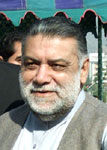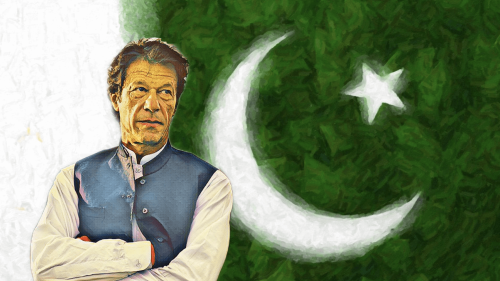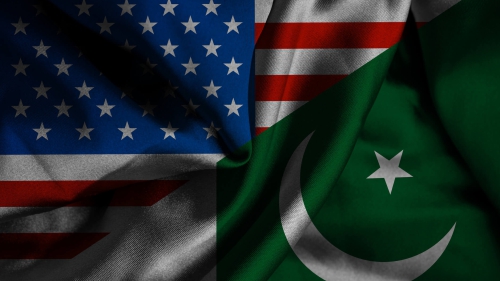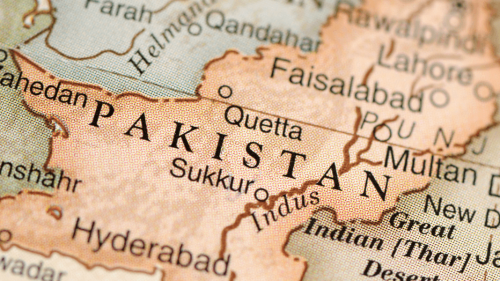Pakistan: The last nail in the coffin
 |
|
Mir Zafarullah Khan Jamali |
While the resignation of Mir Zafarullah Khan Jamali, the first prime minister from Balochistan, is being treated as a routine matter, it is not. Analysts had predicted that Mr Jamali would safely complete his four-year term in office. This, it was hoped, will replicate at the political level the other miracle of the Musharraf era, the completion of an IMF Accord, without missing a tranche.
| The only explanation for forcing Mr Jamali's exit at this point seems to lie in the military's obsession with its 'command and control' of the minutiae of domestic politics. |
The fall of Mr Jamali's government cannot but help bring to mind the dismissal of another prime minister, Mohammad Khan Junejo, whom the military had installed to soothe the festering wounds of Sindh. Some people will argue that unlike Mr Junejo, who dared the military regime of then-president Zia-ul Haq, Mr Jamali resigned 'voluntarily', there is no doubt who really calls the shots in General Musharraf's democratic dispensation. What an infamous journey Pakistan's politics has made from Junejo to Jamali - fast downward.
Mr Jamali was unabashedly obsequious to his military bosses and was always over-eager to do everything at their bidding. If anything, Mr Jamali went too far in allowing the president to usurp the constitutional rights of the prime minister as the chief executive, a title General Pervez Musharraf assumed on staging his coup in October 1999 and never found the grace to grow out of. It is, therefore, very puzzling indeed why the military would like to upset the political apple cart it so dexterously built in the past few years beginning from a sham referendum to the passing of constitutional amendments to legitimize the presidency. It has gone on to bulldoze the passage of the controversial National Security Council bill and to continue its prevarication on the 'uniform' issue.
The only explanation for forcing Mr Jamali's exit at this point seems to lie in the military's obsession with its 'command and control' of the minutiae of domestic politics. This is hardly conducive to the nurturing of Pakistan's stunted democratic process. Instead of imparting a freshness to the process, General Musharraf has turned the domestic political scene into a putrid cesspool of discredited politicians who are being recycled in an unending game of musical chairs. Indeed, by forcing out Benazir Bhutto and Nawaz Sharif, who are arguably no worse than the pack being favored, he has reduced the competition in terms of the political agenda and astuteness to a level that has made Pakistan a laughing stock among political democracies of South Asia.
With such political credentials and with the latest Indian elections having raised the bar of political maturity in the region even higher, it is unlikely that Pakistan can play a leading role in the South Asian renaissance which was heralded by SAARC's last summit in Islamabad. Although the United States is committed to support the military regime through thick and thin, it too would be embarrassed by the continuing erosion of democratic credentials of its Pakistani ally even as it peddles its plan to reduce the democratic deficit of the Islamic world. Instead of providing a lead or inspiration to others in the Muslim world, Pakistan is regressing towards a full-fledged military dictatorship or, at best, an Egyptian-style autocracy. General Musharraf's latest outrage against democracy also makes a mockery of his doctrine of 'enlightened moderation'.
| The Jamali episode is the last nail in the coffin of democracy in Pakistan. It is high time that the civil society in Pakistan forcefully challenges the military's prescription for democracy. It has willfully raised the scarecrow of Islamic fundamentalism and terrorism to save its own skin. |
While the exit of Mr Jamali is itself a great blow to whatever democratic pretensions the present dispensation may have, the manner in which his succession has been orchestrated by the General-President and his men is even more unpalatable. Not only was Mr Jamali forced to sign his political death warrant, he also had to suffer the indignity of naming his own executioner. Constitutionally, he could well have recommended the dissolution of parliament and holding of fresh elections, thereby calling the President's bluff. A Junejo might have risked that. Instead, Mr Jamali was forced, ostensibly as a gesture of goodwill and solidarity, but more likely in deference to realpolitik, to nominate as his successor the person who had been conspiring behind his back to oust him. In the event, Shujaat Hussain, who himself is hardly any more dynamic than the allegedly lackadaisical Mr Jamali, was 'unanimously' chosen for the job, at least for the interim period.
The President himself, contrary to all norms of parliamentary democracy, was reported to be openly canvassing from his parliament chambers to oust Mr Jamali and to install someone he (the president) considered to be more pliable and of more value to his own (and the military's) political ambitions. That choice fell on Shaukat Aziz, the finance minister.
What gave Mr Aziz the edge for being chosen as the person to head the government for the remaining period of its tenure until 2007 over any number of other equally pliant and disposable aspirants? Mr Aziz has the advantage of being among the few internationally presentable persons (with the possible exception of foreign minister Kasuri) while having no real roots in domestic politics, which may tempt him to be less timid than the job description requires him to be.
More importantly, the Musharraf regime, obviously lacking a firm domestic constituency other than the military, needs to capitalize on Mr Aziz's self-created image as the 'turnaround' financial wizard, even though the modest economic achievements of the past five years are more the desert for services rendered by the regime in the war on terror. If, however, the choice of Mr. Aziz is predicated on the vain hope that he would outsmart his Indian counterpart, Dr Manmohan Singh, in either economic savvy or political subtlety, there's grand disappointment in store for Pakistani kingmakers.
The Jamali episode is the last nail in the coffin of democracy in Pakistan. It is high time that the civil society in Pakistan forcefully challenges the military's prescription for democracy. It has willfully raised the scarecrow of Islamic fundamentalism and terrorism to save its own skin. Running with the MMA hare and hunting with the FBI hound, the military's sole purpose has been to indefinitely prolong the lease of its privileged and unfettered rule by converting Pakistan into a permanent security state.
The only safe course for the country is to hold new elections under a consensus-based administrative machinery, such as Mr Brahimi has produced for Afghanistan and Iraq, while it can still be done without the deployment of foreign forces.
S M Naseem is an economist. He is the author of several books and has served with various international organizations, including ESCARP in Bangkok. He was also the head of Pakistan Institute of Development Economics in Islamabad. His e-mail is [email protected]
Source: Daily Times
Related Suggestions
That would be my comment. Jazak Allah, for yours.
Was the reason that this issue does not create a platform to heep blame on the west or others?
I am just wondering.
Its not that which form of government works well.Ruiling is all about giving people their "just" rights.Its about how u rule.

















